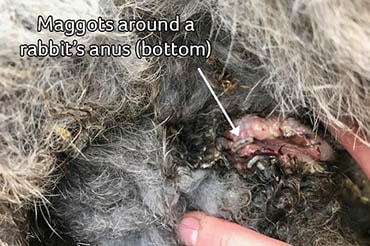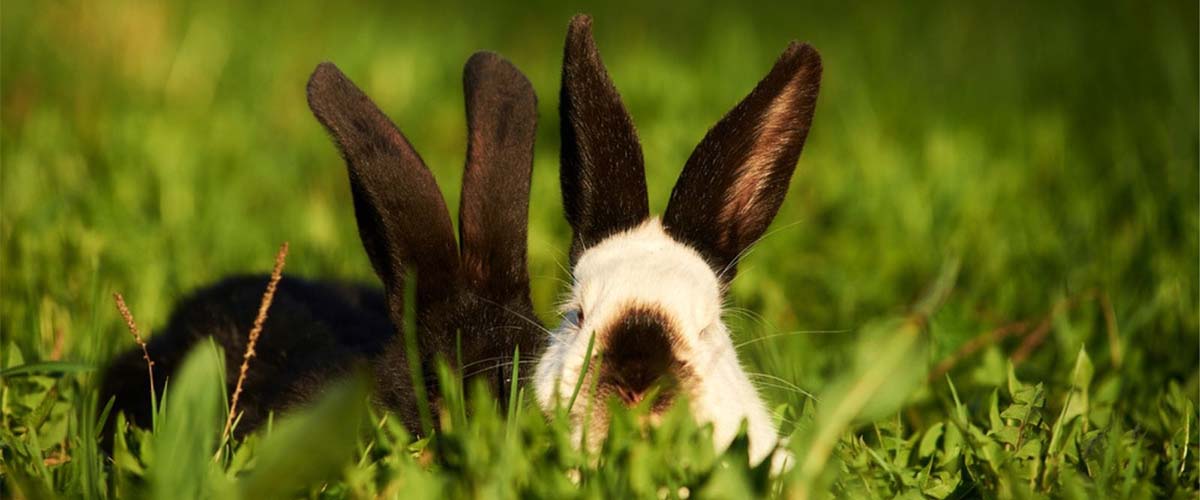Flystrike in rabbits
Overview
- Flystrike is a painful, life-threatening condition caused by maggots burrowing under the skin and feeding on flesh.
- Your rabbit is particularly at risk of flystrike if they have a dirty bottom, open wounds, or live in a dirty environment.
- Contact your vet straight away if you see maggots on your rabbit, or suspect they might have flystrike – the sooner they are treated, the better their chance of recovery.
- Fortunately, it’s easy to prevent flystrike with a few simple precautionary measures.
What is flystrike?
Flystrike, also known as 'myiasis', is a condition caused by flies laying eggs on fur, which then hatch into maggots that burrow under their skin and feed on flesh. Flystrike tends to develop very quickly because it only takes a few hours for fly eggs to hatch, and maggots can cause extensive damage in as little as one day. Flystrike is an extremely painful condition, and can be deadly if it’s not treated quickly enough.

Why do rabbits get flystrike?
Any rabbit can get flystrike if flies lay their eggs on their fur, however, there are some factors which put a rabbit at higher risk of developing this nasty condition:
- Time of year – flystrike is more common in the warm, summer months when flies are most active.
- Dirty bottoms – dirty, damp fur is the perfect place for flies to lay their eggs, so if your rabbit has a mucky bottom, they are at high risk of flystrike. There are many different reasons your rabbit might find it difficult to keep their bottom clean including diarrhoea, tooth pain, arthritis, obesity, or living in a dirty environment.
- Wounds – flies are attracted to wounds and will choose to lay their eggs around them. If your rabbit has a wound, always have it checked by your vet – they'll show you how to keep it clean and protected.
Symptoms
Symptoms of flystrike include:
- Maggots in the fur/under the skin
- Patches of wet fur and fur loss (often around the back end)
- Open wounds or sores containing fly eggs or maggots
- Lethargy (low energy)
- Eating less
- A bad smell
- Collapse
What to do if you find maggots on your rabbit
If you find maggots on your rabbit (even just one), contact your vet immediately for an emergency appointment. Your rabbit will need skilled care from vets and nurses to make sure they have the best chance of recovery. Flystrike can very quickly cause death so the sooner your rabbit is seen, the better their chance of survival.
Do:
- Remain calm.
- Phone your vet straight away.
- Take them to the vet without delay – also bring along the bunny they're bonded with if possible.
Don’t:
- Don't delay getting treatment.
- Don't attempt to treat your rabbit at home or remove the maggots yourself. This will cause pain and could send your rabbit into shock.
- Don't dunk your rabbit in water to try to 'drown' the maggots. This won’t work and can also cause shock.
When to contact your vet
Contact your vet immediately for an emergency appointment if you notice any symptoms of flystrike. Flystrike can very quickly cause death, so the sooner your rabbit is seen by a vet, the better their chance of survival.
You know your rabbits best. If they don’t have the symptoms listed above but you are still concerned it’s always best to contact your vet.
Treatment
Flystrike is an emergency that requires urgent veterinary treatment. Your vet will examine your rabbit, assess their condition, and advise you on the best course of action. If your vet thinks your rabbit’s condition is treatable they will clip their fur, clean their skin, and remove as many maggots as possible. Often this will need to be done under anaesthetic to avoid causing your rabbit further pain or distress. Your vet will give your rabbit pain relief and a medication to kill any remaining maggots/eggs. Your rabbit might also need a fluid drip if they are in shock or dehydrated, and possibly antibiotics if they have an infection.
Sadly, if your rabbit has a severe case of flystrike, and the maggots have caused a lot of damage to their skin and flesh, it’s unlikely that they will recover. If your vet thinks your rabbit has a poor outlook and is suffering, it may be kindest to put them to sleep.
Prevention
Fortunately, there are plenty of ways you can dramatically reduce the chance of your rabbits developing flystrike:
- Keep them clean – avoid attracting flies and other insects by keeping your rabbits and their living space clean – this is especially important during the summer months. Remove pee/poo, dirty litter and wet bedding at least once a day.
- Check them daily – check your rabbits every day to make sure they are clean, dry and free from fly eggs/maggots. Pay particular attention to their bottom, and seek advice from your vet if you notice they have diarrhoea.
- Use a fly repellent – it’s a good idea to use a fly deterrent during the summer months. Speak to your vet about which product to use, and how regularly to apply it.
- Feed them a good diet – rabbits produce soft poo called caecotrophs which they eat as an important part of their diet and later poo out as solid pellets. If your rabbits have a poor diet, these soft poos can stick to the fur around their bottom and attract flies. A diet packed with healthy hay, lots of leafy greens and a side of high-quality rabbit nuggets will keep your rabbits in tip-top condition.
- Exercise – overweight rabbits are more likely to have problems cleaning themselves and keeping their bottoms clean. Space to run, hop and play will mean your rabbits stay fit, slim and able to properly groom themselves.
- Trim long hair – in summer, it’s important to ensure your long-haired rabbits – such as Angoras or Lionheads – are regularly groomed. Trimming the fur around their rear end will help reduce the chance of them getting sticky poo or dirt matted in.
- Monitor wounds closely – keep them clean and dry and make sure there are no sign of maggots. Your vet can give you tips to reduce risks and help healing.
- Make sure your rabbits get regular health checks from the vet –it can be difficult to pick up on the early signs of certain health problems in rabbits so it’s important they get regular check-ups. Hidden health problems like arthritis and dental pain may stop your rabbits from being able to groom as easily.
Published: Oct 2021
Did you find this page useful?
Tell us more
Please note, our vets and nurses are unable to respond to questions via this form. If you are concerned about your pet’s health, please contact your vet directly.
Thank you for your feedback
Want to hear more about PDSA and get pet care tips from our vet experts?
Sign up to our e-newsletter
Written by vets and vet nurses. This advice is for UK pets only. Illustrations by Samantha Elmhurst.

